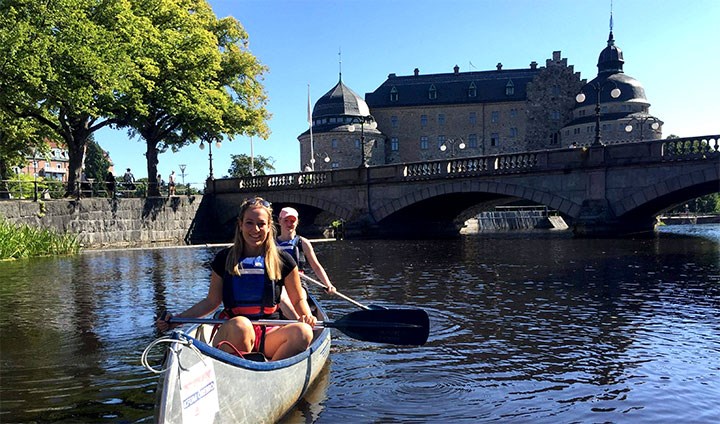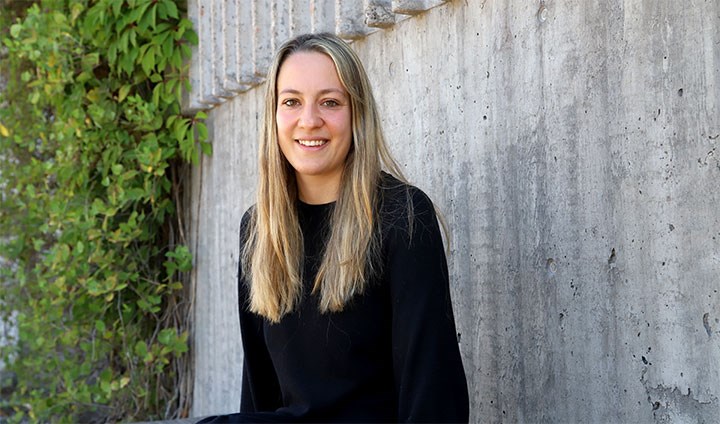“Örebro is the perfect student town”

Katrin Wieder canoeing on River Svartån, with Örebro Castle in the background.
A small town, yet somehow a “big city”, with easy access to nature and nightlife alike – and with a modern and welcoming university offering tuition-free education to students from the EU, EEA and Switzerland.
“Örebro is the perfect town for anyone who wants to explore Sweden,” says Katrin Wieder from Germany, who chose to do a master’s programme at Örebro University.
Two hours by train from Stockholm, on the western shore of Lake Hjälmaren, is Örebro. With a population of just over 150,000, it is Sweden’s seventh largest town. Meandering through the town is the River Svartån, and at its heart is the majestic Örebro Castle – an ancient-looking fortress dating back to the 13th century.
This is where Katrin Wieder from Heidelberg in Germany came to study on an international master’s programme in strategic communication.
“At first sight, Örebro seemed to be a small town. But then I was surprised to find that there was so much to do here. I soon felt at home in Örebro. Both the town and the university are incredibly welcoming,” she says.
Most things within cycling distance
With its many parks and green spaces, nature is just around the corner and the town is surrounded by forests, lakes and hiking trails for those seeking outdoor recreation. Moreover, Örebro boasts a rich arts and culture scene and a bustling town centre with numerous restaurants and bars. Örebro University is a short cycle ride away from the town centre and is host to some 15,000 students.
“For students, this is perfect. Nature is right outside your doorstep and a bike will get you anywhere. Örebro feels safe and there is not a lot of traffic. If you don’t feel like cycling or walking, public transport is very well organised.”

What is more, Örebro is the perfect starting point for anyone wanting to explore Sweden.
“It is both easy and inexpensive to take the train to Stockholm or Gothenburg – and other Scandinavian cities, like Oslo and Copenhagen, are also just a few hours away,” says Katrin Wieder.
Easy to find accommodation
Via the International Office, she was able to go on ski trips to the Swedish mountains, attend concerts, go on guided walking tours and – above all – get to know other students.
“Both the International Office and the teachers at the university are incredibly helpful and look after the students, from day one.”
For students to find accommodation can be a challenge, especially in major cities. But in Örebro, Katrin Wieder found it to be straightforward. She contacted Örebro University’s Housing Office and was allocated a room in student halls right next to the university.
“It was super easy and as a new arrival in town, not knowing anyone, for me it was perfect. There were eight students in the halls, both from Sweden and abroad, and we’ve had such a good time. I’ve made friends for life.”
What is it like to study at Örebro University?
“For me, the studies were a perfect mix of theory and practical elements. Taking one course at a time instead of juggling several simultaneously meant that I could focus on one thing at a time. There are about 20 students on each course, so you are able to cultivate a very close and good working relationship with the teachers.”
Tuition-free studies
For master’s students from countries within the EU, EEA or from Switzerland, studies are free of charge.
“Studying here was free, also for me, even though I already had a master’s degree from Germany,” says Katrin Wieder.
Being used to large lecture theatres and, to a great extent, one-way oriented communication from university teachers in Germany, Katrin Wieder found that the Swedish teaching format took some getting used to.
“You can tell it is important to the teachers that students really understand and reflect on what they’ve learnt. It was challenging at first, but also very interesting and stimulating. I have definitely grown more independent thanks to my studies in Örebro,” says Katrin Wieder.
Text: Anna Lorentzon
Translation: Charlotta Hambre-Knight
